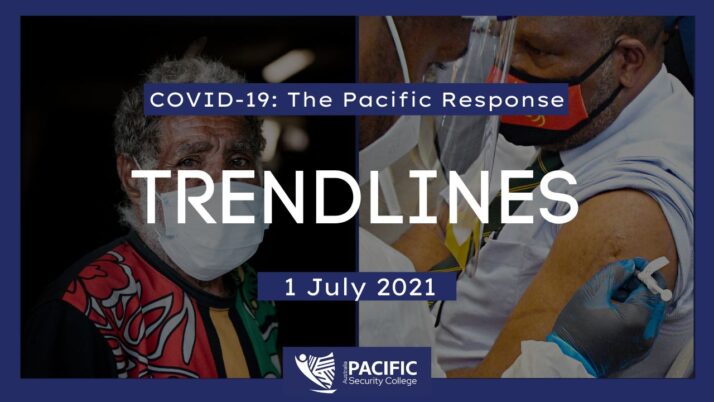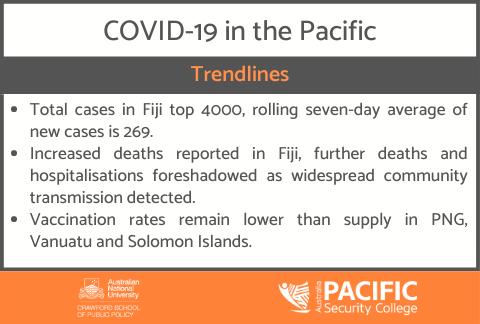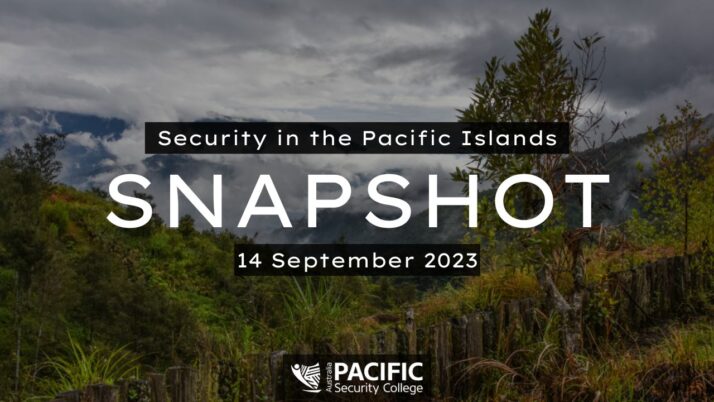COVID-19 – the Pacific Response: 1 July 2021

Spotlight on Fiji
Fiji is refusing to implement a hard lockdown, while vaccine hesitancy is creating increased risk throughout the Pacific, Hugh McClure writes.
This fortnight, this update takes a deeper dive into the rapidly evolving COVID-19 situation in Fiji.
2,626 cases were recorded in Fiji in the 14 days to 28 June, as Viti Levu becomes the Pacific Island region’s COVID-19 epicentre. The country’s rolling seven-day average of cases has reached 269 and is trending upwards. There are 3,306 active cases currently in isolation. The densely populated Suva-Nausori containment zone, which accounts for a third of Fiji’s population, continues to account for the majority of cases. In the 24 hours to 8am on 29 June, 295 of 312 new cases were in the containment zone, and 17 in Western Division.
155,000 tests have been conducted in Fiji since April and 661,584 people have been screened by mobile teams. More than seven per cent of tests are now returning positive results, highlighting widespread community transmission.
All but 67 of Fiji’s 4,144 total COVID-19 cases have been recorded in the current outbreak, which has been active since April. The country has now recorded 21 deaths, 19 of which have occurred since the April outbreak.
Here is a snapshot of policy responses to COVID-19 in the Pacific region, correct as of 12pm AEST, 30 June 2021.
Spotlight on Fiji

More cases, hospitalisations and deaths have been foreshadowed in Fiji for July, as widespread community transmission is continuing in the country.
Despite this, the Fiji Government has resisted a lockdown, with Health Ministry Permanent Secretary Dr James Fong stating that Fiji’s containment policy is akin to lockdowns in Australia and New Zealand, which at most will entail a 24-hour curfew. Instead, greater compliance and more vaccination have been labelled as Fiji’s pathway out.
322,299 vaccines have been administered to date in Fiji. Prime Minister Bainimarama said that the vaccine is ‘key to normalcy’ resuming in the country.
Bainimarama has conveyed his appreciation to Scott Morrison for Australia’s support in already providing 320,000 of a planned one million AstraZeneca doses. Australia and New Zealand have sent a joint medical assistance team to Fiji. New Zealand has additionally provided NZ$482,000 worth of personal protective equipment to Fiji, and NZ$9.3 million for the Fiji Government’s COVID-19 response and assistance to households. In a phone call between the two leaders, Chinese President Xi Jinping has promised greater assistance to the Fijian prime minister.
The adverse impacts of the pandemic on those with underlying health concerns has been brought into focus this fortnight. Dr Fong has said that he has particular concerns about the vulnerability of Fijians with non-communicable diseases, such as diabetes. In addition, civil society and church groups are increasing support to those with disability.
Businesses have taken a hit in the prolonged second wave. The 500 Nausori market vendors have reported a $1 million downturn in profits due to restrictions. 83 per cent compliance with COVID-19 protocols by businesses has been reported. Businesses are increasingly exploring online trading, changing the fabric of Fijian commerce. With incomes scarce, a FJ$50 cash payment has been announced, targeting those in the informal economy.
Other COVID-19 news
307 cases have been identified in Papua New Guinea (PNG) this fortnight, bringing its total to 17,190. 100 cases have been recorded in Guam with 8,088 total, 64 in French Polynesia with 19,003 total and one in New Caledonia with 129 total. No new cases have been recorded this fortnight in Wallis and Futuna, which has recorded 454 in total. In total, the Northern Mariana Islands (CNMI) has recorded 183 cases, Solomon Islands has recorded 20, Marshall Islands (RMI) four, Vanuatu three, and Samoa one.
46,4498 vaccines have been administered in American Samoa, 18,942 in the Cook Islands, 54,578 in the Federated States of Micronesia, 190,624 in Guam, 33,120 in RMI, 55,210 in CNMI, 111,259 in New Caledonia, and 9,313 in Nauru.
698 vaccines have been administered in Niue, 132,540 in French Polynesia, 49,333 in PNG, 27,906 in Palau, and 21,742 in Solomon Islands. There have also been 28,667 vaccines administered in Tonga, 4,772 in Tuvalu, 7,462 in Vanuatu, 8,933 in Wallis and Futuna, and 54,633 in Samoa.
Vaccine hesitancy continues to be a major issue in PNG. Deputy Pandemic Controller Dr Daoni Eserom said that 80,000 doses currently available in the country’s provinces will expire next month. The PNG Council of Churches has declaredits support for the COVID-19 vaccination drive. This comes as the World Bank has approved an additional $40 million in funding to PNG to provide additional support for the country’s COVID-19 response, including vaccine deployment.
The Vanuatu Government is providing free shuttle buses to transport people to Port Vila to receive the vaccine. There are now 24,000 AstraZeneca doses and 20,000 Sinopharm doses in the country, however, just 7,462 have been administered. Meanwhile, the Malvatumauri Council of Chiefs endorsed a resolution that Vanuatu maintain its lockdown until all chiefs and their people are satisfied that COVID-19 is no longer a threat. The Council has also called for ni-Vanuatu to embrace traditional lifestyles amidst the pandemic.
Analysis has revealed the impact of the COVID-19 pandemic-induced border closures on New Caledonia’s economy. 900 jobs have been lost, as well as $665 million from the territory’s economy, with collapsed tourist revenues and a fall in metal shipments the key contributors.
Some of the region’s territories are under reduced restrictions this fortnight. With vaccination rates having now topped 60 per cent, the remaining curfews and business limits have been removed in CNMI for the first time since September. Schools have reopened in Wallis and Futuna and the night-time curfew has been lifted in Tahiti.
Briefly, health facilities and courts in the Marshall Islands have reported an increase in domestic violence, mental illness, and drug misuse during the pandemic. 97 per cent of eligible Niueans have now received their vaccine, just three weeks after inoculations began. There is concern in Cook Islands that 200 people who received their first vaccine dose have not returned for their second. Finally, Facebook has launched a public education campaign in Solomon Islands, Tonga, New Caledonia, Cook Islands. and Wallis and Futuna to combat health misinformation shared on the site.
Hugh McClure
More Stories

Security Snapshot - 28 Mar 2024
Pacific Security Snapshot | 28 March 2024
Summary ➣ Heavy rains, floods, landslides and earthquakes batter the region ➣ Pacific submissions to the International Court of Justice (ICJ) on climate change responsibility ➣ Elections across the Pacific prompting changes to diplomatic relations and security arrangements ➣ Challenges for women in politics Climate Security Lives have been lost in PNG after a series…

Security Snapshot - 15 Sep 2023
Pacific Security Snapshot | 15 September 2023
The security stories shaping the region ➣ Pacific Islands Forum Women Leaders Meeting ➣ Pacific High-Level Dialogue on Climate Change ➣ Fiji to sign Status of Forces Agreement with France ➣ Palau expands United States maritime law enforcement agreement ➣ Papua New Guinea special elite force to combat tribal violence ➣ Australia extends police presence…






